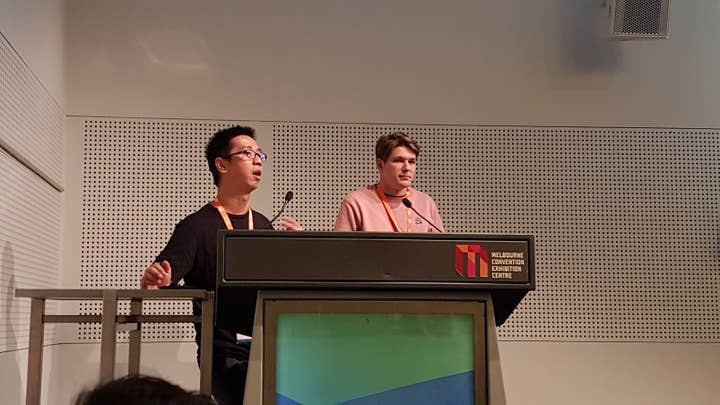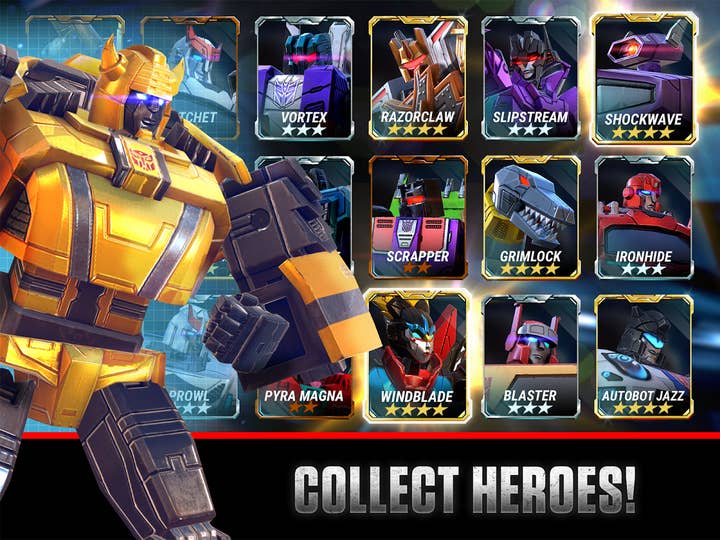Yodo1's AI-driven whale hunt is a bad look for the games industry | Opinion
Transformers players spending $150k grabbed headlines, but Yodo1's GCAP talk raised tough questions about responsible monetisation in mobile
Numbers can often supply a ready-made angle for a story. The depth of a price cut, the unsettling scale of redundancies, the length of a surprise delay; in each case, the headline would hang upon on a number, and the bigger the number, the better.
It was no surprise, then, to see reports -- per Kotaku -- of Yodo1 CEO Henry Fong's awed revelation that a player had spent $150,000 (USD) in Transformers: Earth War. That is a huge, almost inconceivable number for a player to spend on a single game, and it was also no surprise that developer Space Ape Games then sought to create a little distance between its work and the apparent machinations of the company handling its business in China.
But that one, astonishing number was not the whole story. Not least because, as our own Rob Fahey pointed out in his op-ed last week, there is nothing intrinsically wrong with a single player spending a vast amount of money on a single game -- even a sum as vast as $150,000. However, when the amount reaches that level some important caveats come into play, Fahey said -- "I'd want to feel pretty confident that the person involved can afford $150,000, for a start."
"About a year ago I decided, what if I could teach AI how to find whales inside of games?"
Henry Fong
I was in the audience at Game Connect Asia Pacific when Fong delivered his talk, and much of what he said besides that enormous number spoke directly to this concern -- a concern that has been at the very heart of so much debate this year, as politicians across the world have turned their attention to the ethical and moral responsibility the games industry has (and seems to abdicate) when monetising its audience.
Fong was actually the host of a larger session involving two of Yodo1's Australian clients: Hipster Whale, the creator of Crossy Road, and Featherweight Games, the studio behind Rodeo Stampede. By working with Yodo1, both companies had fulfilled the objective laid out in the title of the session: "Making Great Money to Make Great Games."
"So why am I giving this talk about making great money from great games?" Fong asked the GCAP audience. "I got into the games industry not to make money, but because I love games... Games are my passion. I've been playing games, and actually making games since I was about eight years old, when I got my first Commodore 64.
"The other reason is that I'm actually really good at making money. It's not something I love doing, but it's something I've learned to do and I'm really good at, and I started doing at a really young age."
One of Fong's early slides provided the evidence; a linear path from making money selling PCs at the age of 14, right up to making multiple millions in the present day from Yodo1 and (in an odd detail on the slide) "flipping houses in Macau."
"I made my first million at Microsoft, then I made a few more after that," Fong said. "But who's counting?"

Yodo1 was born out of the idea to combine what Fong loved (games) with what he was good at (making money), and the company has generated $150 million in revenue from its games in its lifetime. Hipster Whale (which was absent from the talk, leaving Fong to give its presentation instead) and Featherweight gave an impression of how they had made money from their products, but the idea that generated the headlines arrived after the developers had finished speaking.
"Some of the interesting things [Yodo1 is] doing, because I'm really lazy," Fong said. "We've learned a lot about making money from games, and making and managing good games. About a year ago I decided, what if I could teach AI how to do all of this? What if I could teach AI how to make money from this? What if I could teach AI how to find whales inside of games? What if I could teach AI how to moderate a game community of millions of players?
"The accuracy at picking potential whales after 14 days was about 87%. We think we can get it up to about 95%"
Henry Fong
"[Then] I wouldn't have to do it. That was really the impetus for us going down that path."
The investment in AI from companies like Google, Microsoft and Amazon have resulted in toolsets that "make it really, really easy" to apply AI to a host of different problems. "All it takes is the right data and the right application," Fong said, and "as a game monetisation company we already had years and years of very granular data that we could feed into the AI models, and kind of train AI up."
In setting up the motivation for using AI, Fong asked a series of questions that it could help to answer. Finding whales was just one of them, but it was the question that Yodo1 focused on, and the question Fong chose to highlight in his talk at GCAP.
"Let me tell you why that's important," Fong said. "In a game like Rodeo Stampede, we got a lot of players, and they all spend a bit of money. A big player might spend a couple of hundred bucks. In a game like Transformers: Earth Wars, a whale spends $150,000 (USD) in the game. So knowing who they are, and knowing how to manage them, is extremely important."
The conversation that followed the revelation of that $150,000 spend at least calls into question how important many believe it is for single players to spend such enormous sums, but that is Yodo1's goal for its new AI application. According to Fong, it took about a month to build the technology, and it was then fed two-and-a-half years of detailed behaviour and monetisation data collected from players.
"As of last week, the accuracy of the AI application at picking potential whales after 14 days was about 87%," Fong said. "We think we can get it up to about 95%."
Sitting in the crowd, it was hard not to be reminded of Google's demonstration of its AI Assistant booking an appointment at a hair salon. While the technology was undeniably impressive, the reaction demonstrated that many people have ambiguous feelings about the hidden use of AI to interact with and guide the decision-making of real people. In the Q&A session, GamesIndustry.biz asked for more information on how the AI "manages" players into becoming whales.
"The AI is trying to predict which players could become a whale," Fong said. "We built a data model that analyses the behavioural differences between people that become whales, and people that leave the game or don't spend any more money. We were looking at characteristics like spending patterns, spending velocity, the amount of time they spent in game, how many sessions, what they would buy, what guilds they're in.
"I always used to think that if you monetise your audience too hard, they'll leave the game. But it's actually the other way around"
Henry Fong
"It's a lot of stuff, and it's really hard for a human to crunch all of this data -- especially in real-time."
To give an impression of the quantity of data that Yodo1 collects, Fong said that it would take one human an entire year to "crunch" what it collects in a single day. Around two-and-a-half years of that data was fed into the AI that finds players with the potential to become whales.
"Once you know that this is a potential whale, they could go either of two ways: they can stay in the game and become a whale, or they can decide that this game is not for me, I'm gonna take my money and go elsewhere," Fong continued.
"By being able to predict who they're gonna be, we can then start to analyse how to keep them in the game [and] analyse their behavior. How do I increase their sessions? How do I increase their session times? How do I gently present to them a very attractive in-game bundle that is going to help them stay in the game?
"The funny thing is, I always used to think that if you monetise your audience too hard, they'll leave the game. But it's actually the other way around. Our retention rates for paid users in this game [Transformers] -- 30-day retention for paid users -- is 85%. So once they start spending, they don't leave. They want to stay in the game and preserve their investment, and when they stay in the game, they spend more."

This speaks to the point raised by Rob Fahey. It could be argued, he said, that it is not the responsibility of the developer or publisher to make sure players can afford to spend huge sums, just as it's not the responsibility of the bank to make sure that every penny of a bad loan is spent wisely. However, that argument overlooks the unique qualities of the relationship between a game and its players - particularly in the context of free-to-play mobile games.
"It would also be intellectually dishonest to ignore the fact that mobile game monetisation is inherently a process of creating wholly artificial scarcity of items whose necessity, creation and consumption the developer alone can control," Fahey said. "That's a lot of power over how much compulsion a player feels and it does, I think, introduce a slightly different moral argument to the question of whether the game operator has a responsibility to ensure they're not doing financial harm to their players."
Fong said on numerous occasions that players "spend when they want to... there's no pressure, they spend when they want to spend." Can the presence of an AI loaded with vast quantities of data explicitly designed to construct ways to get a player to spend more money be interpreted as "pressure"? It is a valid question, and it is the kind of question being asked more and more frequently by people both inside and outside the industry.
"I spend money in games to be entertained. If I don't want to spend, nobody can force me to spend"
Henry Fong
In the Q&A session, a member of the crowd asked what Fong would say to someone "who has issues with the concept of whales." When asked to elaborate, the person described the "psychological tricks" that can be used to encourage a player to spend money in free-to-play games. Fong chose to respond from his own perspective, citing the example of Tencent's Arena of Valor, a game he played for 18 months and spent the equivalent of around $0.15.
"It's really hard to get [players] to spend money in a game, by the way, but once I do [pay money], I can spend a lot," he said. "Another game I played for a month, and I spent $8,000. I spend money in games to be entertained. If I don't want to spend, nobody can force me to spend. If I want to spend, I'm happy to spend within my means.
"So when you're designing your game systems, keep that in mind. Design it from the player's perspective. There will be things that we design that we will price specifically... We'll do a price elasticity analysis, and we will price it so that, if you're a kid or someone that can't afford to spend thousands on a game, we'll price it so high that you won't even consider looking at it. It will be priced at $300 a pop -- you'll likely not even go near it.
"But for someone who can afford to spend thousands or even tens of thousands, they'll look at it and go, 'Oh, $300 bundle? $1,000 in value, let's pick that up.'"
This assumption that players only ever spend what they can afford is both dubious and problematic. As a millionaire many times over -- "who's counting?" -- a $300 bundle is of course affordable to Fong, but the idea that a kid presented with that same bundle "won't even consider looking at it" is at the very least fanciful.
What was missing from Fong's analysis of the need for AI to "manage" players into becoming whales was an acknowledgement of a third option in the stage before a player chooses that path. They can stay and spend or leave and spend elsewhere, of course, but they can also stay and spend money they can't afford or (in the case of younger players) shouldn't be spending at all.
The role game companies play in enabling compulsive behaviour is one of the primary concerns fuelling political and legal pressures of the kind embodied by this year's DCMS enquiry in the UK -- in which the participating game companies were described as "wilfully obtuse" around the key issues, and accused of only paying "lip service" to avoiding problematic monetisation methods.
What the DCMS would make of Yodo1's AI -- with its 87% success rate, rising to 95% -- is anyone's guess. But removing the last scintilla of human oversight from the gap between a player and $150,000 of their money is a very bad look for the games industry.

